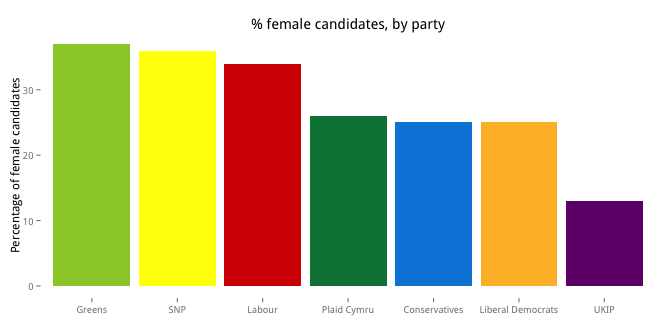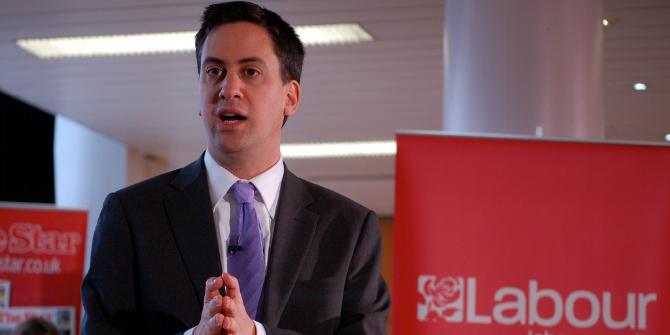 Throughout the short campaign, this blog will be publishing a series of posts that focus on each of the electoral regions in the UK. In this post, Gidon Cohen discusses the key things to look out for in the North East.
Throughout the short campaign, this blog will be publishing a series of posts that focus on each of the electoral regions in the UK. In this post, Gidon Cohen discusses the key things to look out for in the North East.
See electionforecast.co.uk’s predictions for the North East here.
The North East, the smallest of England’s regions, has the strongest regional identity of anywhere in England. Sometimes the North East has been presented as a critical arena. When the Conservatives held their conference in Gateshead in 2008 they linked it to the point of no ‘no go areas’. However, the way that the British electoral system translates votes into seats means that at least from this the picture from the region is likely to be a pretty unexciting one of continuing one party (Labour) domination. The 2015 general election won’t be decided by dramatic changes in the North East.
The region is made up of twenty eight seats. It takes in urban centres like Newcastle/Gateshead, Sunderland, and Middlesbrough as well as large areas of open countryside including the Cheviot Hills in the North and the Pennines in the South. However, despite the associated variation in its social make-up the region is well known as a Labour heartland. Famously Durham was the first County Council which Labour won (in 1919). For the majority of the period since 1945 Labour have dominated the seat count. This extends to the rural areas which might be expected to provide the Conservative Party with solid support, but which contain the Durham and Northumberland ex-coalfields and hence some of Labour’s safest seats. In the Labour landslide of 1997 they won all but two of the regions seats. In the period between 1997 and 2010 many leading figures in the Labour governments held safe seats in the North East.[1] Even with the national retreat in the 2010 General Election Labour still won 24 of the 28 North East seats.
That doesn’t mean that the Conservatives have never had any success in the region. At their post-war regional peak in 1959 they won 44% of the votes and ten seats in the North East.[2] However, during subsequent periods of national advance Conservative support has risen by less in the North East than in many other parts of the England, and even more significantly is very inefficiently distributed. Even in 1983 the Conservatives only won only half of the seats they had in their previous peak.[3] In 1997 the Conservative Party came within a whisker of being completely wiped out, holding the single seat of Hexham by just 222 votes. Subsequent recovery has been comparatively weak, and it was not until 2010 that they won a further seat, Stockton South.
Although Liberals were very strong in across the region in the interwar years, they were wiped out after 1945.[4] They didn’t seriously contend for a seat until a 1973 by-election when Alan Beith, standing down in 2015, won Berwick-upon-Tweed.[5] The SDP held Stockton South from 1983-7, but despite very considerable strides forward in local government elections across the region the Liberal Democrats did not manage to further add to their seat total before 2010. However, last time round they dramatically won in Redcar with the largest swing in the election in the wake of discontent about the Government’s handling of the closure of the Corus steelworks.
Going into the 2015 General Election the seats which seem most likely to change hands are the two held by the Liberal Democrats. In the South of the region Labour is looking to retake Redcar against a Lib Dem majority of 5214. That is a decent sized majority, in normal circumstances we would also expect there to be a benefit from incumbency to be factored in. Further, there has been some very substantial infighting in the local Labour Party, with the deselection of the council leader and subsequent resignations leading to the loss of Labour control.[6] Nevertheless, the Liberal Democrat vote across the country has taken a substantial hit, there were very specific reasons why they took the seat in 2010, and it is not clear that the local infighting will be electorally consequential. Taking all this into account it seems likely but not certain that they will lose it this time round. Berwick, where the Conservatives are challenging and the Liberal Democrats have a majority 2,690 is also hard to call but the personal vote which Alan Beith has built up is substantial, and without this it is difficult to see the Liberal Democrats holding on.
Conservative held Stockton South, with a majority of just 332 is even more marginal. The question of whether the Conservatives can hold on pits any benefit which James Wharton will gain against a national swing to Labour. Even a modest swing will see Labour take the seat, but present estimates make this a very marginal calculation.
Aside from these three seats and the safe Conservative seat of Hexham, Labour holds all of the rest of the seats in the region, and Labour in England is likely to make modest gains. Labour’s most marginal seat is Middlesbrough South and East Cleveland, which Tom Blenkinsop won in 2010 with a majority of 1,677 after the sudden death of the previous Labour MP, Ashok Kumar. A swing of less than 2% would see the Conservatives win the seat. Nevertheless, with a new MP and a national movement towards, rather than away from, Labour it would be a major shock if this were anything other than a hold.
There is an important narrative in the region that it is largely ignored by London elites, and particularly in comparison to Scotland does poorly on funding and resources questions. This might create the possibility that other parties, particularly those positioning themselves as anti-establishment could do well.[7] UKIP came second to Labour in the 2013 South Shields by election, they seem to be polling best along coast and from the own accounts they are particularly targeting Hartlepool where they have won a couple of council seats. The Greens are also campaigning hard and have a current councillor in Middlesbrough, although it is difficult to see them coming second in any of the regions seat. Irrespective, likely levels of support for these parties won’t change the seat complexion, or indeed have the effect of increasing the number of closely contested seats. The votes going to the minor parties seem to be coming disproportionately from challenging parties, and the effect of splitting the opposition parties vote will likely be to make safe seats safer without increasing the winning party’s vote share.
There are then important contests which are likely to see seats change hands in the North East, likely Berwick-upon-Tweed and Redcar, and possibly Stockton South too. However, the likely picture after the election will be continued of Labour domination, with the Liberal Democrats losing their two sets with one to Labour and one to the Conservatives.
Notes:
[1] Not just Tony Blair (Sedgefield) but also David Miliband (South Shields), Peter Mandleson (Hartlepool), Hilary Armstrong (North West Durham), Alan Milburn (Darlington), Mo Mowlam (Redcar) and Nick Brown (Newcastle East).
[2] Berwick, Hexham, Newcastle North, Newcastle East, Tynemouth, Darlington, Middlesbrough West, Sunderland South, the Hartlepools and Cleveland.
[3] Langbaurgh, Darlington, Hexham, Newcastle Central, Tynemouth. They won Stockton South but lost Newcastle Central in 1987.
[4] Even the country’s most famous Liberal, Sir William Beveridge, architect of the welfare state, could not hold on to his seat of Berwick-upon-Tweed.
[5] Called after the Conservative minister Viscount Lambton resigned in the wake of a very high-profile scandal.
[6] http://www.gazettelive.co.uk/news/teesside-news/new-leader-redcar-cleveland-council-8637054
[7] Although the North East Party set up to make precisely this case is unlikely to be more than an electoral sideshow.
 Gidon Cohen is Senior Lecturer in the School of Government and International Affairs, Durham University.
Gidon Cohen is Senior Lecturer in the School of Government and International Affairs, Durham University.








Cant believe the British public can be so naïve as to give the people of Britain another 5 years with a Government that cant even uphold the rule of law, what were we thinking ?